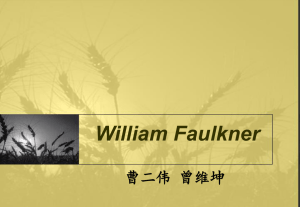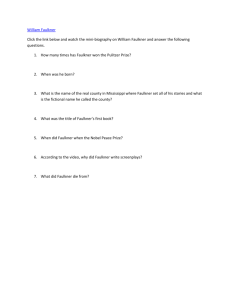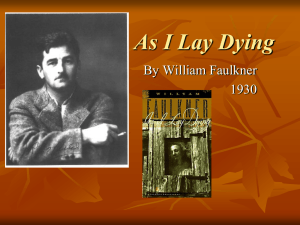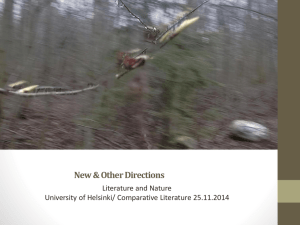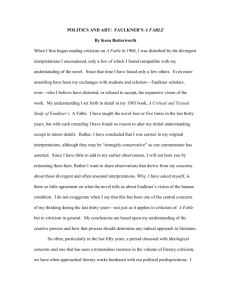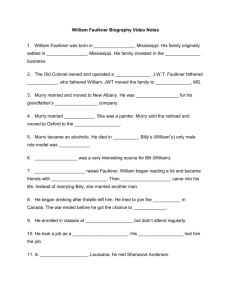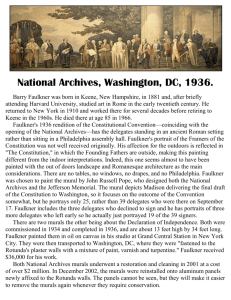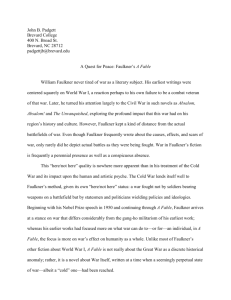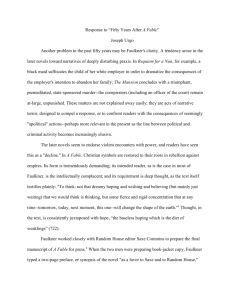Noel Polk - William Faulkner Society
advertisement
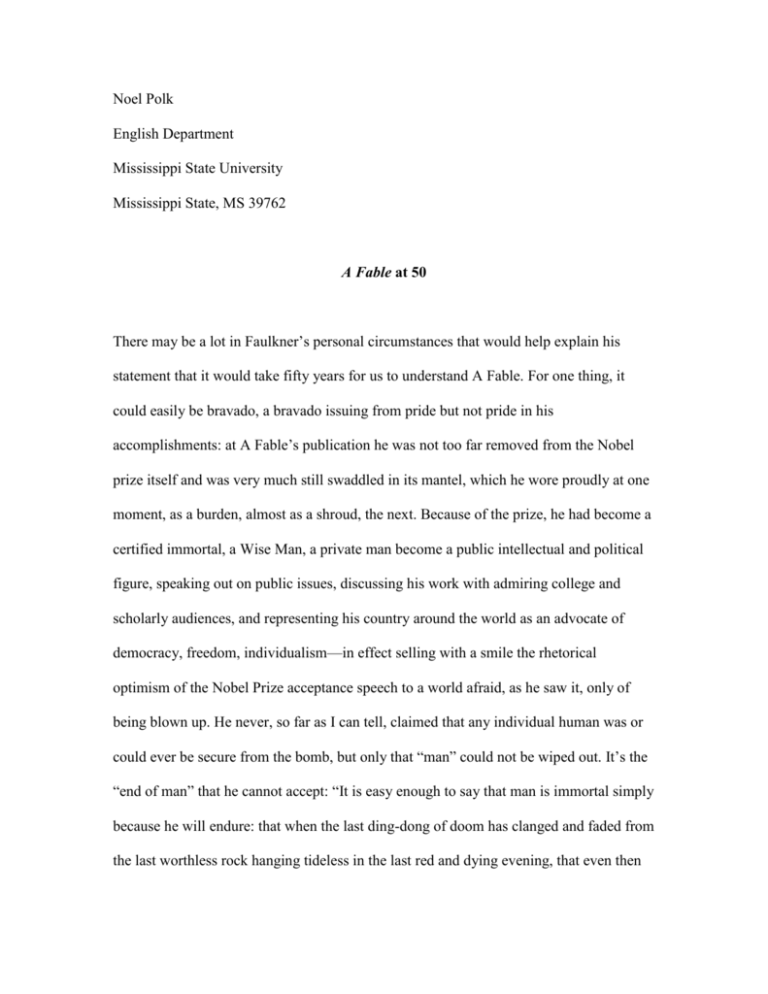
Noel Polk English Department Mississippi State University Mississippi State, MS 39762 A Fable at 50 There may be a lot in Faulkner’s personal circumstances that would help explain his statement that it would take fifty years for us to understand A Fable. For one thing, it could easily be bravado, a bravado issuing from pride but not pride in his accomplishments: at A Fable’s publication he was not too far removed from the Nobel prize itself and was very much still swaddled in its mantel, which he wore proudly at one moment, as a burden, almost as a shroud, the next. Because of the prize, he had become a certified immortal, a Wise Man, a private man become a public intellectual and political figure, speaking out on public issues, discussing his work with admiring college and scholarly audiences, and representing his country around the world as an advocate of democracy, freedom, individualism—in effect selling with a smile the rhetorical optimism of the Nobel Prize acceptance speech to a world afraid, as he saw it, only of being blown up. He never, so far as I can tell, claimed that any individual human was or could ever be secure from the bomb, but only that “man” could not be wiped out. It’s the “end of man” that he cannot accept: “It is easy enough to say that man is immortal simply because he will endure: that when the last ding-dong of doom has clanged and faded from the last worthless rock hanging tideless in the last red and dying evening, that even then there will still be one more sound: that of his puny inexhaustible voice, still talking. I refuse to accept this” (ESPL 120). Somehow, individual human beings took heart at these sentiments, still do, though nothing in his words suggests that any individual will survive the bomb. Thus in a curiously paradoxical way, Faulkner seems actually to be endorsing the man-in-the-mass, the crowd, that he so despised in other statements. It is a mass made up of individuals, to be sure; but it is the mass that will endure and prevail, not the individual, though some individual in the crowd will survive, to create the poetry that will help the crowd endure and prevail. I have argued elsewhere, following Keen Butterworth and Morse Peckham (who also followed Keen!), that there were good and proper reasons at that time and place for any form of optimism, especially as he spoke in venues that called for platitudes of hope for the future: the Nobel Prize speech, and the graduation ceremonies at Oxford High School and Pine Manor Jr College, all three of which ceremonies include his daughter Jill in the audience: they were times for public utterances, which he graciously supplied, not times to speak of his own gloom, his own unhappiness, even at the pinnacle of any writer’s success. So I do not either criticize or defend Faulkner during the years that he was finishing A Fable, but merely observe what might have been going on in his tragedian’s alcoholic and no doubt clinically depressed mind during the first lustrum of the fifties. He had until just recently been the archetypal modernist author—intensely private, working at his craft in solitude against all odds and with no wish for financial success or glory—I give no fart for glory, he so famously said. That persona had worked well for him: indeed, had gained him both commercial success and glory, in spades, and now he had waked up to find those very anti-social qualities that had made him immortal being used by the US State Department and various other publicity machines both to put him at the center of the public eye as a special individual, and to make him “one of us,” Citizen Faulkner, through a process that Roland Barthes called the “proletarianization of the author.” The final shot of Omnibus’s feature film on Faulkner, first shown on TV in 1953 or 1954, shows him sitting in a tractor seat, smoking a pipe, and looking out across his property or into the universe (we can’t really tell), the very stereotype of a visionary. The voiceover tells us that William Faulkner is “a farmer, who looks deep into the human heart and writes what he sees.” Just one of us, you see? Harmless, see? On our side, see? I dont want to accuse Faulkner of hypocrisy in any of this; in fact, in that Omnibus film he seems perfectly aware of what he is doing and seems to be enjoying himself immensely—and why should we deny him that pleasure? Even so, I suspect that at some deep level he may have felt some friction between the civic-minded man of hope and the tragedian, whose vision of the world he had been trying to understand and describe for nearly three decades was getting darker and darker by the minute, perhaps not in spite of his fame but because of it. He wrote letters during these years that were at darkening odds with his public pronouncements, and maybe he had some trouble reconciling the public Faulkner with the dark prophet who was writing A Fable. At about the same time he was finishing A Fable, he wrote two very interesting shorter pieces, one a memoir of Sherwood Anderson, the other a short story called “Mr Acarius.” He closes “A Note on Sherwood Anderson” by referring to his mentor as “a giant in an earth populated to a great—too great—extent by pygmies, even if he did make but the two or perhaps three gestures commensurate with gianthood.” “Mr Acarius” is a partly autobiographical portrait of a very successful man who wants to check into a hospital so he can go on a gigantic no-holds-barred binge, so that he can get down and roll in the sewer with real people and so efface his own giantism, his own separation from the common folk. In this he is very like the runner in A Fable, who reneges on being an officer who has the right to shoot his underlings if they do not obey his every order; he does not want that power, gives up his officer’s stripes, returns to the ranks, and becomes a common soldier, a messenger, so as to suffer what they suffer. Faulkner well knew that he himself had made more than “two or three gestures commensurate with gianthood,” and no doubt that was the source of pride. At his age, having overcome so many obstacles, having written his guts in to so many masterpieces, wearing the Nobel crown and having been certified immortal and yet just a farmer who looks deep into the heart and writes what he sees, he now a writer who had not only Shakespeare and Melville and Joyce looking over his shoulder, he had himself to compete with too: what he had done during the last 30 years was not himself in the present moment, not William Faulkner but “Faulkner,” a far more menacing competitor than those others, a literary phenomenon glaring down at him as he struggled with the current project. He who had prided himself on recreating the novel with every novel he wrote was now engaged must have thought of the lightning speed with which he had written the masterpieces by which he had become “Faulkner,” must have looked at the reams of manuscript and typescript working papers of A Fable with some despair—page after page of scenes retyped over and over again with almost no change. One wonders if those repetitions represent his attempts to get himself recharged, to get his juices flowing again so that he could complete the work to which he had been committed as his “magnum O.” Perhaps, then, his claim that it would take us fifty years to understand it is little more than the bravado of hope and despair, a sort of whistling in the dark a bleak melody of his fears that his powers had indeed left him. It may be simpler than that, too. It may be that he worked so hard on it because it was so different from everything else he had ever done or would do and that he had faith in it worthy of the Faulkner of the past 30 years. The part of me that has invested in A Fable’s excellence and its importance wants to believe that Faulkner thought its depths would not be available to readers for 50 years for the very simple reason that it did go so completely against the presumed hope-in-the-face-of-despair that he had been branded with because of his speeches. He understood the mass mind very well, understood very well how humanity insists upon having some stable ideology at its center to cohere around, whether political or religious. And he knew very well that in A Fable he was rewriting what one of his characters in Soldiers’ Pay (I believe) calls “the fairy tale that conquered the Western world,”—the story of Jesus and his crucifixion: rewriting it not in the simplistic terms that in fact nearly every reader has taken it be, but rewriting it in terms that subjected it to the most intense examination of cultural phenomena that he had ever undertaken, to demonstrate in novel form how the West’s belief in the Christ story rendered it vulnerable to generals and admirals and presidents and fuhrers, who could thus bend them easily to their will, by confirming in them what they wanted and needed to hear. In one sense, in public, he was telling the world what it wanted to hear; in the sense of his fiction, he was telling it something he very well knew it did not want to hear and would not listen to. He gave us fifty years to catch on, but we still haven’t—as witness the current political climate in this country. But dont get me started on that.
